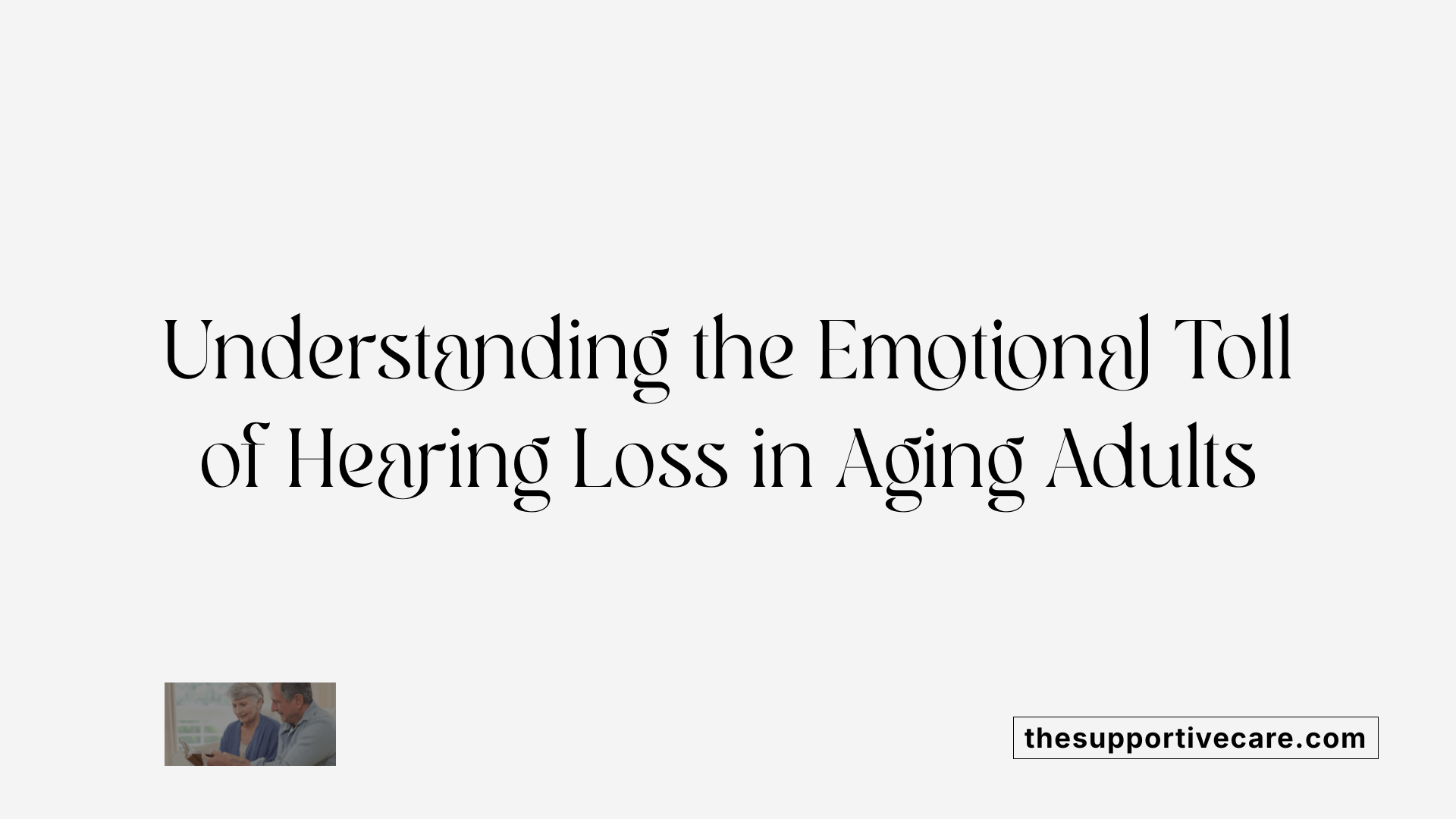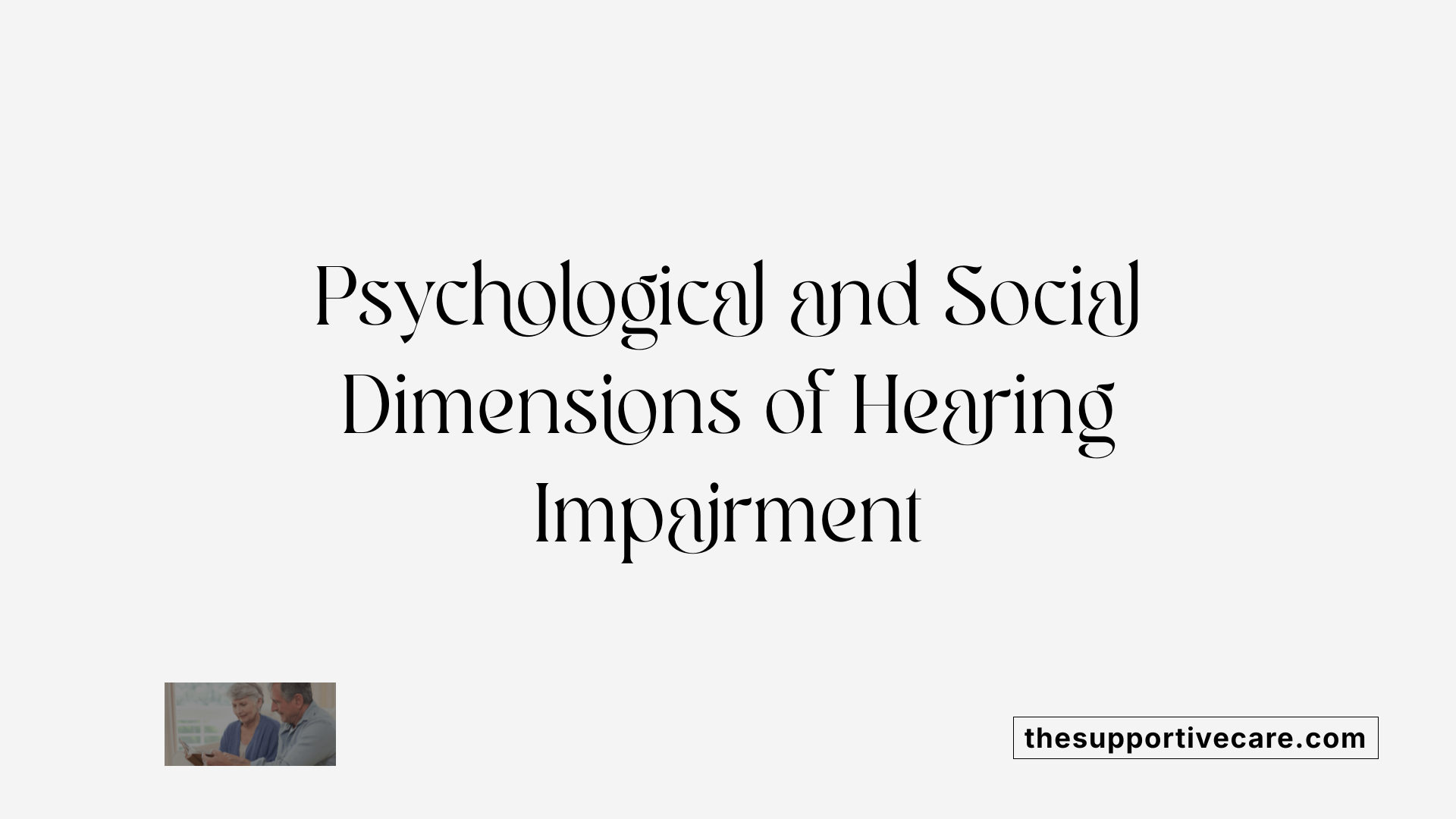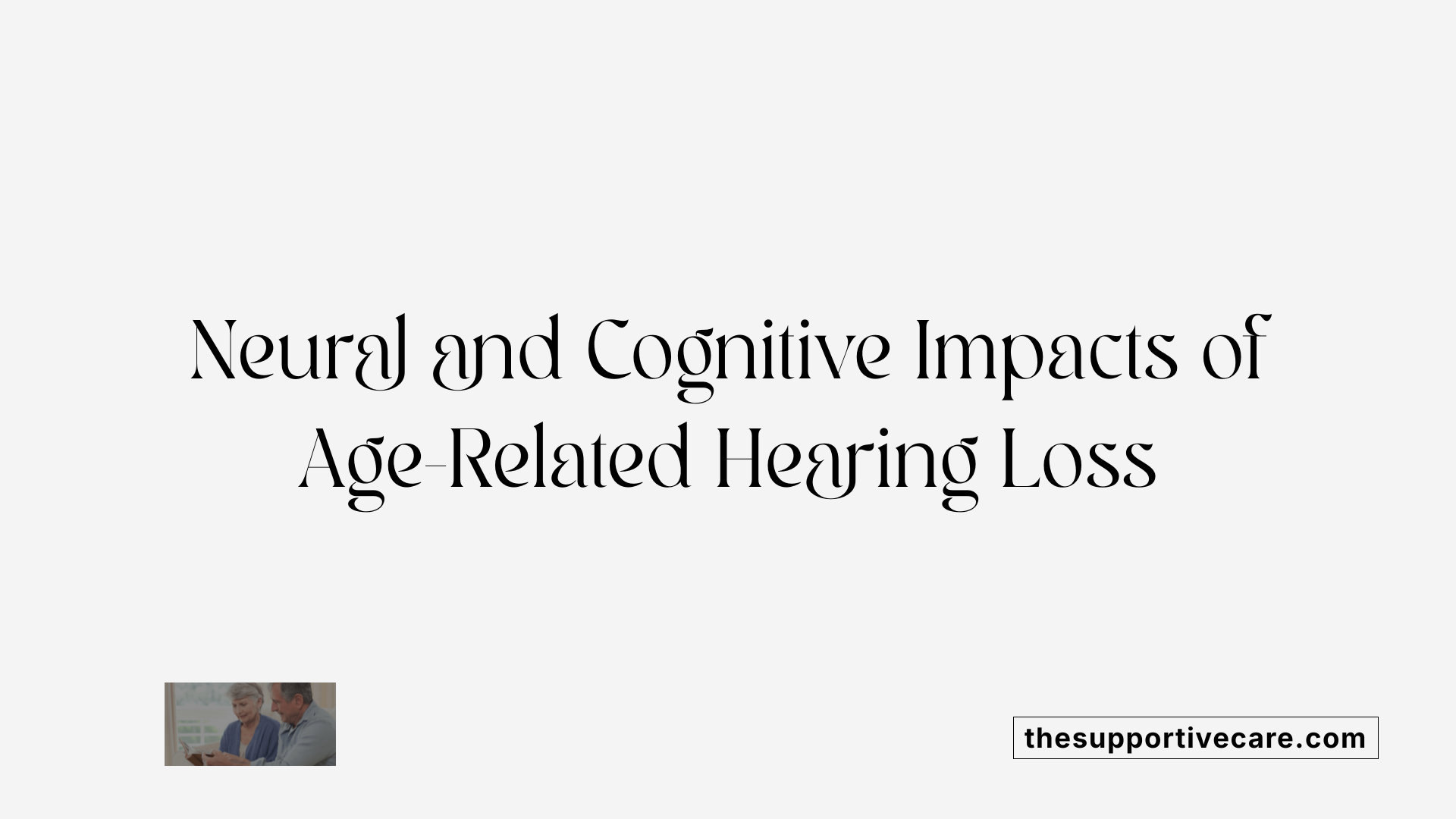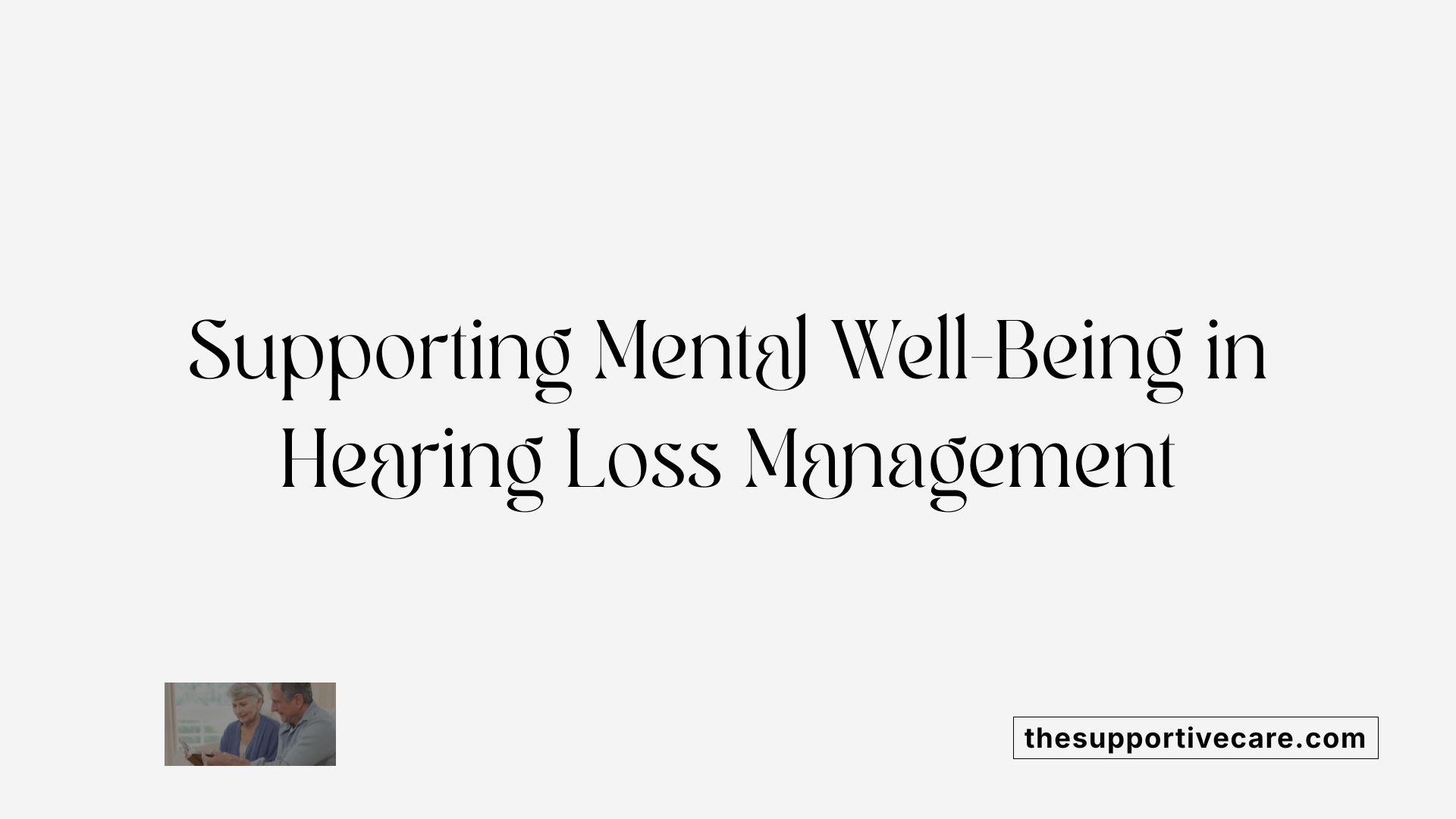Understanding the Psychological Impact of Hearing Impairment in Aging Adults
Hearing loss in older adults is a common yet often overlooked factor that profoundly affects mental health and emotional well-being. As sensory decline becomes more prevalent with age, its ripple effects extend beyond mere communication difficulties, influencing social interactions, cognitive function, and psychological resilience. This article explores the multifaceted psychological effects of hearing impairment, emphasizing the importance of early diagnosis, intervention, and awareness to improve quality of life among aging populations.
The Emotional Consequences of Hearing Loss in Older Adults

How does hearing loss affect mental health and emotional well-being?
Hearing loss in older adults can have profound effects on their mental health and emotional stability. It often leads to increased symptoms of depression, as individuals feel disconnected from their social environment and struggle with communication. Anxiety can also rise due to worries about safety, losing independence, or facing social embarrassment. Many people with untreated hearing impairment report feelings of frustration, shame, and social withdrawal.
This social disconnection is a major contributor to loneliness and feelings of isolation, which further worsen mental health outcomes. The emotional toll of hearing loss can manifest through decreased participation in social activities, making everyday interactions more stressful and less enjoyable.
Fortunately, early intervention with hearing aids and supportive counseling has been shown to reduce psychological distress. A 2020 study published in The Journal of the American Medical Association found that using hearing aids significantly lowered depression and anxiety symptoms within just three months of use.
Additionally, hearing loss can lead to cognitive decline, which impacts memory and decision-making. The increased brain effort to interpret sounds and the social isolation linked with hearing impairment can accelerate brain atrophy related to aging.
Addressing hearing loss comprehensively through medical treatment, psychosocial support, and community resources helps preserve emotional well-being. Enhancing communication abilities can boost self-esteem, reduce feelings of frustration, and improve quality of life.
Is there a link between hearing loss and depression or anxiety?
Research consistently shows a strong connection between hearing impairment and mental health conditions such as depression and anxiety. Older adults and working-age adults with untreated hearing loss are significantly more prone to experiencing emotional distress. They often struggle with the social implications of hearing difficulty, including feelings of inadequacy, shame, and frustration.
A notable study involving over 5,000 Chinese older adults found that hearing loss was associated with a 47% higher likelihood of experiencing depression symptoms. The same research indicated that psychological distress mediates part of the relationship between hearing impairment and depression, emphasizing the mental health risks.
Untreated hearing problems can lead to social withdrawal, which reduces mental stimulation and increases feelings of loneliness. This social isolation is a major factor in the development of depression and anxiety among those affected.
Using hearing aids and consulting mental health professionals can effectively lessen these risks. Enhancing listening abilities and providing emotional coping strategies can improve overall mood and reduce feelings of worry and hopelessness.
Impact on overall emotional well-being and mental health risks
Hearing loss poses a significant threat to overall emotional stability and mental health. It can contribute to a cycle where social withdrawal leads to loneliness, which in turn intensifies depression and anxiety.
The psychological impact extends beyond mood disorders. It includes reduced self-esteem, frustration, and a sense of loss regarding independence. These factors can collectively impair quality of life and hinder aging well.
Preventive and supportive measures are crucial. Early diagnosis and the use of hearing devices can help maintain social connections and emotional resilience.
Support organizations and counseling services provide valuable resources for coping with the emotional challenges of hearing impairment. Promoting awareness about these effects can help older adults seek timely help, ultimately safeguarding their mental health.
| Aspect | Effect | Additional Notes |
|---|---|---|
| Increased symptoms | Anxiety, depression, emotional distress | Psychological symptoms linked with social impacts |
| Feelings involved | Loneliness, frustration, shame, social withdrawal | Contribute to mental health decline |
| Impact on well-being | Reduced life satisfaction, lower self-esteem | Affects cognitive function and aging process |
| Intervention importance | Hearing aids, counseling, social support | Evidence supports early treatment benefits |
| Consequences of untreated | Accelerated cognitive decline, increased depression | Enhances the importance of timely diagnosis and intervention |
Understanding the Psychological and Social Dynamics of Hearing Loss

What are the psychological effects of hearing loss in aging adults?
Hearing loss in aging adults often brings about profound psychological challenges. Many individuals experience increased symptoms of anxiety and depression, which can be compounded by feelings of loneliness and social withdrawal. This emotional distress often stems from difficulties in communication, resulting in frustration and a sense of social disconnection. Such feelings not only impair overall mental health but also heighten the risk of cognitive decline and conditions like dementia.
Research indicates that these psychological impacts are somewhat independent of the severity of hearing impairment, meaning even mild hearing loss can exert emotional tolls. However, early diagnosis and the consistent use of hearing aids significantly improve quality of life by making social interactions easier and reducing depressive symptoms. Gender differences have also been observed, with men generally experiencing higher levels of psychological distress related to hearing loss.
Addressing hearing impairment effectively through audiology treatments and counseling is crucial. These interventions help curb negative emotional reactions and promote mental well-being, emphasizing the importance of early assessment and proactive management.
What are the social and cognitive consequences of hearing impairment in older adults?
The social consequences of hearing impairment in older adults are far-reaching. Communication difficulties often lead to social withdrawal and decreased participation in community and family activities. This social isolation elevates feelings of loneliness and can precipitate depression, adversely affecting overall mental health.
From a cognitive perspective, hearing loss is linked with declines in various mental functions, including global cognition, executive functioning, processing speed, and memory. Studies suggest that hearing impairment contributes to brain atrophy, particularly in regions responsible for processing sounds, which may accelerate cognitive deterioration.
Furthermore, evidence points to hearing loss as a modifiable risk factor for dementia. Interventions such as hearing aids and cochlear implants have the potential to mitigate this risk by maintaining neural stimulation and promoting social engagement.
Neural changes due to sensory deprivation could hinder high-level cognitive functions, exacerbating the risk for neurodegenerative diseases. Thus, early identification and management of hearing loss are vital for improving both social and cognitive health outcomes among older adults.
| Aspect | Impact | Evidence | Intervention Strategies |
|---|---|---|---|
| Psychological | Increased anxiety, depression, loneliness | Studies link hearing loss with higher depressive symptoms and emotional distress | Early treatment, counseling, support groups |
| Social | Social withdrawal, reduced participation | Associations with social isolation and feelings of estrangement | Hearing aids, social engagement programs |
| Cognitive | Decline in memory, processing speed, brain atrophy | Research shows hearing impairment as a risk factor for dementia | Hearing aids, cognitive training |
| Neuroscience | Cortical reorganization, neural atrophy | Brain imaging reveals structural changes linked to hearing loss | Sensory rehabilitation, auditory training |
Overall, managing hearing loss through early assessment and intervention can help preserve social engagement and cognitive functions, ultimately improving quality of life for the aging population.
Neural and Cognitive Aspects of Age-Related Hearing Impairment

What are the neural and cognitive impacts of age-related hearing impairment?
Age-related hearing loss (ARHL) affects more than just the ears; it has profound impacts on brain structure and function. Research indicates that it causes atrophy in key brain regions, including the auditory cortex, hippocampus, and other areas involved in processing sound, memory, and emotion. Brain imaging studies reveal decreased gray matter volume and disturbed neural connectivity, especially within neural networks related to speech comprehension and emotional regulation.
This deteriorative process is linked to increased cognitive load. When hearing is impaired, the brain must work harder to interpret sounds, leading to mental fatigue and depletion of cognitive resources. This excessive effort can hasten declines in memory, processing speed, and decision-making abilities.
Hearing loss also influences emotional well-being by fostering social isolation, which reduces mental stimulation vital for brain health. The social withdrawal often observed in individuals with hearing impairment can alter neural pathways, further compounding cognitive decline.
Overall, age-related hearing impairment interacts with neurodegenerative processes by promoting brain tissue loss and disrupting neural networks. These changes contribute significantly to the increased risk of dementia and other age-related cognitive disorders.
What scientific research has been done on the psychological effects of hearing loss?
Scientific investigations have established a clear link between hearing loss and psychological effects across various populations. Studies show that hearing impairment elevates emotional distress levels, often manifesting as heightened anxiety, depression, and a decline in subjective well-being.
In older adults, untreated hearing loss correlates with greater social withdrawal, loneliness, and feelings of frustration, which can escalate into clinical depression. Research also points to increased emotional sensitivity and reduced self-esteem among those with hearing difficulties.
Interventions such as the use of hearing aids have demonstrated effectiveness in alleviating some of these psychological challenges. For example, a 2020 study published in The Journal of the American Medical Association found that early hearing aid use is associated with reduced psychological distress and improved mental health outcomes.
Furthermore, early diagnosis and psychosocial support, including counseling and support groups, are encouraged to address the emotional toll of hearing impairments. Overall, the research underscores the importance of comprehensive management of hearing loss—not only to restore auditory function but to also safeguard mental health and emotional resilience.
How do neural atrophy and increased cognitive load contribute to mental fatigue?
Neural atrophy in the auditory cortex and related brain regions diminishes the brain’s efficiency in processing sound and other cognitive functions. As the brain’s auditory areas shrink or lose connectivity, it must compensate by reallocating resources, which increases cognitive effort.
This compensatory effort involves heightened activation in remaining neural circuits, leading to a state of mental fatigue. The ongoing strain can impair concentration, decision-making, and memory, increasing susceptibility to cognitive decline over time.
Simultaneously, the increased cognitive load caused by trying to understand speech in noisy environments or during conversations drains mental energy. This overload not only causes fatigue but also limits the capacity for other cognitive activities, further diminishing overall cognitive resilience.
Research indicates that this heightened effort and consequent fatigue can accelerate neurodegeneration, emphasizing the importance of early intervention and auditory rehabilitation to reduce the long-term cognitive burden.
How does hearing loss impact memory, processing speed, and cortical connectivity?
Hearing impairment directly affects neural connectivity linked to speech perception, emotional processing, and cognitive functions. Reduced auditory input leads to decreased stimulation of the auditory cortex and associated neural pathways, which can result in decreased connectivity within these networks.
This diminished neural activity correlates with declines in memory performance and slower processing speeds. For instance, without consistent auditory engagement, the brain’s ability to organize and retrieve memories can weaken, contributing to cognitive deficits characteristic of aging.
Moreover, the disruption of cortical connectivity impairs the brain’s overall integration, hindering efficient communication between different regions involved in higher-order cognition. Over time, these changes increase vulnerability to dementia and other neurodegenerative conditions.
In summary, hearing loss leads to structural brain changes and functional disconnections that compromise cognitive processes, underscoring the importance of addressing hearing health in aging populations.
| Aspect | Impact | Explanation |
|---|---|---|
| Neural atrophy | Brain tissue loss | Decrease in gray matter volume in auditory and related regions |
| Increased cognitive load | Mental fatigue | Brain compensates for hearing difficulties but drains cognitive resources |
| Memory and processing | cognitive decline | Reduced neural stimulation weakens memory and slows processing |
| Cortical connectivity | Impaired neural communication | Disruption in neural networks affecting multiple cognitive functions |
Additional insights
- About 52.9% of those over 90 experience ARHL, highlighting its prevalence.
- Hearing aids and cochlear implants can boost neural activity and connectivity.
- The connection between sensory deficits and neurodegeneration emphasizes early detection's importance.
Through understanding these neural and cognitive pathways, health professionals can better tailor interventions to preserve brain health and improve quality of life for aging adults suffering from hearing loss.
Interventions and Support for Psychological Well-being

What coping strategies can help mitigate mental health issues related to hearing loss?
Managing the emotional and mental health challenges associated with hearing loss requires practical and emotional coping techniques. Open communication with loved ones, colleagues, and caregivers about hearing difficulties fosters understanding and encourages support. Using assistive listening devices such as hearing aids, cochlear implants, or speech-to-text apps can greatly enhance communication, reducing frustration and social withdrawal.
Environmental adjustments also make a difference. Arranging furniture for better viewlines, choosing quieter environments for social interaction, and minimizing background noise help individuals better understand speech and feel more included.
Engaging in regular self-care activities is vital. Exercise, maintaining good sleep habits, and practicing relaxation techniques such as mindfulness or breathing exercises help reduce stress and emotional fatigue.
Seeking psychological support through counseling or joining peer support groups can provide a safe space to express feelings of sadness, anxiety, or frustration. These groups also offer community connection, which can combat feelings of loneliness often linked to hearing impairment.
Simple strategies like staying socially active, setting achievable goals for communication, and using visual cues during conversations also bolster emotional resilience.
How can education and awareness about hearing loss help address its mental health risks?
Raising awareness about hearing health is crucial for early identification and intervention, which can substantially lessen its psychological impact. Education about the signs of hearing loss encourages individuals to seek timely medical assessment and supports the adoption of hearing aids or other assistive technologies.
Reducing stigma associated with hearing impairment is equally important. When communities understand that hearing loss is common and manageable, individuals are more comfortable discussing their condition and seeking help.
Knowledge about the emotional consequences of hearing loss, such as loneliness, frustration, and depression, empowers individuals and caregivers to take proactive steps. It promotes the use of counseling services that address emotional well-being and encourages participation in social and support networks.
Furthermore, awareness campaigns can guide communities to implement inclusive communication strategies, like using clear speech and visual cues, fostering social inclusion and reducing feelings of social isolation.
By spreading information about prevention, treatment options, and emotional support resources, education initiatives help mitigate mental health risks, improve coping abilities, and enhance overall quality of life for those experiencing hearing difficulties.
| Aspect | Impact | Supporting Details |
|---|---|---|
| Early Recognition | Reduces psychological burden | Promotes timely intervention and prevents social withdrawal |
| Stigma Reduction | Facilitates openness | Encourages seeking help without shame |
| Community Education | Improves social inclusion | Encourages adaptive communication and supportive environments |
| Support Resources | Enhances resilience | Offers emotional assistance and practical coping strategies |
Understanding the broad effects of hearing loss and actively promoting awareness leads to better mental health outcomes. When individuals, families, and communities are informed, they can proactively address the psychological challenges and support affected individuals in maintaining their well-being.
Addressing the Psychological Impact of Hearing Loss in Aging Adults
Understanding the profound psychological effects of hearing loss is crucial for improving the mental health and overall well-being of older adults. Early diagnosis, treatment with hearing aids, counseling, and increased awareness can significantly reduce feelings of social isolation, depression, and anxiety. Community support, education, and personalized interventions are vital in fostering resilience and promoting mental health in this vulnerable population. By recognizing hearing loss not only as a sensory deficit but as a significant factor influencing mental health, caregivers, healthcare professionals, and society can work together to enhance quality of life and mental resilience among aging adults.
References
- Can Hearing Loss Affect Mental Health in Older Adults?
- Impact of hearing impairment on psychological distress and ...
- Psychological profile and social behaviour of working adults with ...
- Cognitive function and psychological well-being in older adults with ...
- Exploring the role of psychological well-being in the impact of ...
- Hearing Loss and Mental Health - HelpGuide.org
- Effects of Resilience, Self-Perceived Hearing Difficulty, and ...



































































































